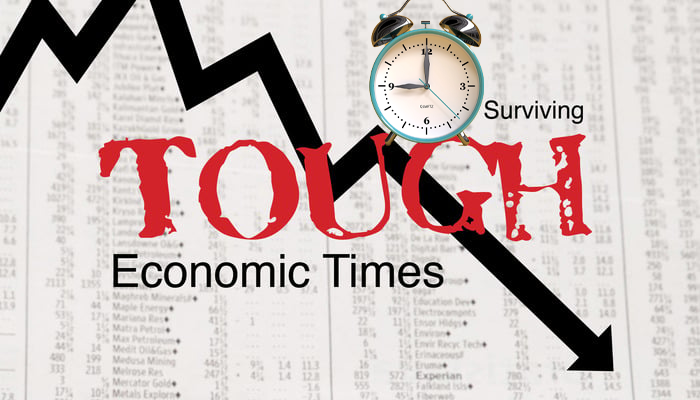Expert Opinion : Surviving tough Economic times

It is no longer news that we are faced with several dire situations. The South Africa of today is plagued by several challenges in the economic, political and social space/environment. These among others threaten the stability of the country and to a broader extent our livelihoods. Issues of corruption, unemployment, crimes and load shedding which have taken a more severe dimension have continued to put stress on the ailing South African Economy. This is coupled with the recent increase in the Repo rate by the reserve bank by 25 basis points. With the repo rate standing at 7.25% coupled with a high inflation rate which has already eroded the consumers’ buying power, you don’t need any prophet to tell you that challenging days lie ahead. An economy that is just trying to get over the COVID-19 pandemic is still being bedevilled by several domestic and foreign challenges. On the domestic scene, the July 2021 unrest (insurrection) in KZN and part of Gauteng coupled with other political issues continued to exact damaging effect on the Rand. On the international scene, the spillover effect of the Russia -Ukraine conflict on domestic food prices and inflation is damaging. It must be noted that about a third of the world’s wheat is exported from Russia and Ukraine. They are also among the top five global exporters of barley, sunflowers, and maize.
The food security crisis has worsened since the invasion of Ukraine by Russia. This is because many African countries rely on food and energy supply from either Ukraine or Russia. The war has distorted the global commodity market, supply chain and trade flows to Africa. The attendant effect has been an increase in food and energy prices. Economies with little or no trade relations with these war-torn countries are not left out (isolated). Higher commodity price has also impacted their economies indirectly. A setback like this couldn’t have happened at a worse time than now- when the economy was recovering and policymakers were addressing the socioeconomic consequences of the COVID-19 pandemic and other development challenges.
Several organizations including the United Nations, World Bank, African Union etc. have continually developed policies to enhance food security across the world. This has led to a world-interconnected food system to ensure the efficient and effective distribution of food items across board. Currently, about 80 percent of the world’s population relies on food imports which amounts to about a 300% increase in spending on food items compared to 2000 (Economist, 2020). Furthermore, FAO (2020) indicated that 20% of the dietary energy supply is from imported food. In addition, about 85% of the wheat supply in SSA is imported. This, by implication, means that countries across the world rely on both import and export food items to meet their consumption and economic objectives. For example, in 2019, Canada imported about 462.4 billion USD worth of goods and exported 450.8 billion USD (World Bank, 2022). The war with its attendant effect does not only erode the living standard of the people but also magnifies macroeconomic imbalances. Due to this challenge and other domestic problems, As noted, economic growth in South Africa was revised downward to 0.3%. Furthermore, with the current repo rate of 7.25% and inflation rate which is still far from the target midpoint, the living standard of the citizenry is lowered. This would imply a higher cost of living due to higher bond repayment (an increase of about R167 monthly for a bond of R1m), increased food prices, electricity prices, fuel prices etc. A continuous rise in commodity prices relative to the income of the poor tends to reduce their living standard. It is noteworthy that food prices represent about 40% of consumer demand in Sub-Sahara Africa. The worsening energy crisis is of great concern for the ailing South African economy. Several small businesses are at risk of collapse (if not already) while big industries are spending several millions of rands to stay afloat.
Given all these challenges, how do we survive?
According to Robert Schuller “Quitters never win, winners never quit”. I think this is necessary at this time. Financial stress has a great influence on your mental and physical health as well as your quality of life. According to Robinson and Smith (2022) “Feeling beaten down by money worries can adversely impact your sleep, self-esteem, and energy levels. It can leave you feeling angry, ashamed, or fearful, fuel tension and arguments with those closest to you, exacerbate pain and mood swings, and even increase your risk of depression and anxiety”. We must stay resilient and maintain a hopeful look no matter how bad things can be. This will go a long way in how you respond to events. More importantly, you can seek financial advice from your advisor on how to restructure your spending. However, it is important to keep track of your finances and ensure you only spend on things that are necessary whilst you defer other needs to a later date. Create a monthly budget and ensure you spend within that budget. With the increase in repo rate which implies a higher interest rate, you will need to minimize credit card debt and also avoid impulse spending. Look for other streams of income that can cushion the effect of the crises on your finances. It is also important to think outside the box.
- Dr Kehinde D Ilesanmi : Lecturer , Department of Economics














Leave a Reply